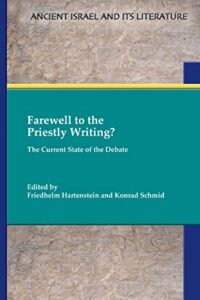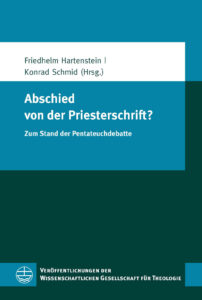HARTENSTEIN, F.; SCHMID, K. (eds.) Farewell to the Priestly Writing? The Current State of the Debate. Atlanta: SBL Press, 2022, 296 p. – ISBN 9781628372656.
Nas discussões sobre a origem do Pentateuco a tradição sacerdotal (P) constitui tradicionalmente um ponto de referência indiscutível para os diferentes modelos críticos das fontes, e é a única camada literária com vocabulário característico e uma concepção teológica que pode ser diferenciada de outros textos não sacerdotais.
das fontes, e é a única camada literária com vocabulário característico e uma concepção teológica que pode ser diferenciada de outros textos não sacerdotais.
Esta tradução em inglês de Abschied von der Priesterschrift? Zum Stand der Pentateuchdebatte (Leipzig: Evangelische Verlagsanstalt, 2015) revisita o debate acadêmico em torno da Hipótese Documentária e a posição do chamado material sacerdotal, seja como uma fonte escrita independente ou como uma redação dentro dos livros de Gênesis a Números. Os colaboradores incluem Christoph Berner, Erhard Blum, Jan Christian Gertz, Christoph Levin, Eckart Otto, Christophe Nihan e Thomas Römer.
Friedhelm Hartenstein é professor de Antigo Testamento na Universidade Ludwig Maximilian de Munique, Alemanha. Konrad Schmid é professor de Bíblia Hebraica e Judaísmo Antigo na Universidade de Zurique, Suiça.
No Prefácio da obra os organizadores explicam que a identificação da tradição sacerdotal do Pentateuco, a conhecida fonte P, vista como um escrito independente, é um dos resultados mais significativos da pesquisa histórico-crítica.
Três características nos permitem identificar a tradição P no Pentateuco:
. Os textos duplicados, como, por exemplo, Gn 1 e 2, duas diferentes histórias da criação
. O uso de “Elohim” para falar de Deus ao longo do livro do Gênesis e na primeira parte do livro do Êxodo
. Os conceitos linguísticos e teológicos típicos do pensamento sacerdotal que permeiam vários textos.
No entanto, os últimos quarenta anos – ou seja, a partir dos anos 80 do século XX – testemunharam reviravoltas significativas nas discussões da literatura sacerdotal no Pentateuco. Desde a obra de Frank Moore Cross e de Rolf Rendtorff, o caráter de P como fonte independente tem sido questionado, e desde a obra de Lothar Perlitt e Thomas Pola, o problema de seu final literário tornou-se cada vez mais controverso. Na pesquisa atual, não se pode mais presumir que os textos sacerdotais constituíam uma fonte anteriormente independente, nem que P se estende de Gn 1 a Nm 36.
Independentemente de como alguém avalia essas questões debatidas, continua sendo verdade que a resposta a elas afetará o modelo de composição do Pentateuco de modo significativo. Muitos julgamentos fundamentais sobre o desenvolvimento do Pentateuco, bem como a história da religião e teologia do antigo Israel e Judá, dependem de avaliações crítico-literárias do escrito P. Tanto as hipóteses documentárias mais antigas quanto as mais recentes o consideram a narrativa básica do Pentateuco. A tradição P está, portanto, no centro das mais importantes teorias histórico-literárias sobre a formação da Bíblia Hebraica.
 Quer alguém mantenha, abandone ou modifique a hipótese da tradição P, os ensaios neste volume oferecem observações e argumentos a favor de cada uma dessas posições, que devem informar as decisões acadêmicas em qualquer direção.
Quer alguém mantenha, abandone ou modifique a hipótese da tradição P, os ensaios neste volume oferecem observações e argumentos a favor de cada uma dessas posições, que devem informar as decisões acadêmicas em qualquer direção.
O presente volume contém os textos da conferência “Adeus ao Código Sacerdotal? O estado atual do debate sobre o Pentateuco” parte da seção Bíblia Hebraica/Antigo Testamento na Wissenschaftlichen Gesellschaft für Theologie, que aconteceu em Stuttgart-Hohenheim, Alemanha, de 17 a 19 de maio de 2012.
Agradecemos aos palestrantes Christoph Levin (Munique), Erhard Blum (Tübingen), Jan Christian Gertz (Heidelberg), Christoph Berner (Göttingen, agora Kiel), Eckart Otto (Munique), Christophe Nihan (Lausanne) e Thomas Römer (Lausanne e Paris) por suas contribuições que fornecem um panorama do estado atual das discussões sobre os textos sacerdotais no Pentateuco.
In discussions of the origin of the Pentateuch, the Priestly source traditionally constitutes an undisputed reference point for different source-critical models, and it is the only literary layer with concise terminology and a theological conception that can be extracted from a non-Priestly context. This English translation of Abschied von der Priesterschrift? Zum Stand der Pentateuchdebatte revisits the scholarly debate surrounding the Documentary Hypothesis and the so-called Priestly material’s position either as an independent written source or as a redaction within the books of Genesis through Deuteronomy. Contributors include Christoph Berner, Erhard Blum, Jan Christian Gertz, Christoph Levin, Eckart Otto, Christophe Nihan, and Thomas Römer.
Friedhelm Hartenstein is Professor of Old Testment at Ludwig Maximilian University of Munich. He is the author of Die bleibende Bedeutung des Alten Testaments (2016), coeditor of Psalmen und Chronik (2017), and coauthor of The Hermeneutics of the Ban on Images: Exegetical and Systematic Theological Approaches (2021).
Konrad Schmid is Professor of Hebrew Bible and Ancient Judaism at the University of Zurich. Schmid is the author of A Historical Theology of the Hebrew Bible (2019), coauthor of The Making of the Bible (2021) and coeditor of A Farewell to the Yahwist? The Composition of the Pentateuch in Recent European Interpretation (2006).
Foreword
Identifying the Pentateuch’s Priestly Code as an originally independent source is one of the most prominent and recognized results of historical biblical scholarship. The success of this hypothesis is due to three basic observations, which have been described and expressed many times ever since biblical criticism’s beginnings. First, there are the notable doublets of certain narrative materials. Second, the theological conception of אלהים is a characteristic of these writings, which, like the first feature of doublets, is essentially limited to Genesis and the first part of the book of Exodus. And third, linguistically and theologically peculiar concepts have greatly supported the identification of Priestly text segments. Particularly striking is how frequently these first two observations overlap, with traditions of doublets often using אלהים terminology in one of the versions.
identification of Priestly text segments. Particularly striking is how frequently these first two observations overlap, with traditions of doublets often using אלהים terminology in one of the versions.
However, the last forty years have witnessed significant developments in discussions of the Priestly literature in the Pentateuch. Since the work of Frank Moore Cross and Rolf Rendtorff, P’s character as an independent source has been questioned, and since the work of Lothar Perlitt and Thomas Pola, the problem of its literary ending has become increasingly controversial. In current research, one can no longer presume that the Priestly texts were a formerly independent source, nor that P extends from Gen 1 to Nm 34.
Regardless of how one assesses these debated questions, it remains true that the response to them will impact one’s model of the Pentateuch’s composition in fundamental ways. Many foundational judgments regarding the Pentateuch’s development, as well as ancient Israel and Judah’s history of religion and theology, depend on literary-critical assessments of the Priestly texts. Both the older and newer documentary hypotheses have considered it the Grundschrift of the Pentateuch, and some more recent approaches to the Pentateuch’s composition argue that it either inaugurates or at least propagates the canonical portrait of a transition from the ancestral to the exodus narratives. The Priestly Code is thus at the center of crucial literary-historical theories about the formation of the Hebrew Bible.
Whether one maintains, abandons, or modifies the hypothesis of the Priestly Code, the essays in this volume offer observations and arguments in favor of each of these positions, which should inform scholarly decisions in either direction.
The present volume contains proceedings from the conference “Farewell to the Priestly Code? On the State of the Pentateuchal Debate,” part of the Hebrew Bible/Old Testament section at the Wissenschaftlichen Gesellschaft für Theologie, which took place in Stuttgart-Hohenheim on 17–19 May 2012.
We thank the speakers Christoph Levin (Münich), Erhard Blum (Tübingen), Jan Christian Gertz (Heidelberg), Christoph Berner (Göttingen, now Kiel), Eckart Otto (Munich), Christophe Nihan (Lausanne), and Thomas Römer (Lausanne and Paris) for their contributions that supply a picture of the current state of discussions about the Priestly texts in the Pentateuch.
Friedhelm Hartenstein and Konrad Schmid
Munich and Zurich, July 2022

